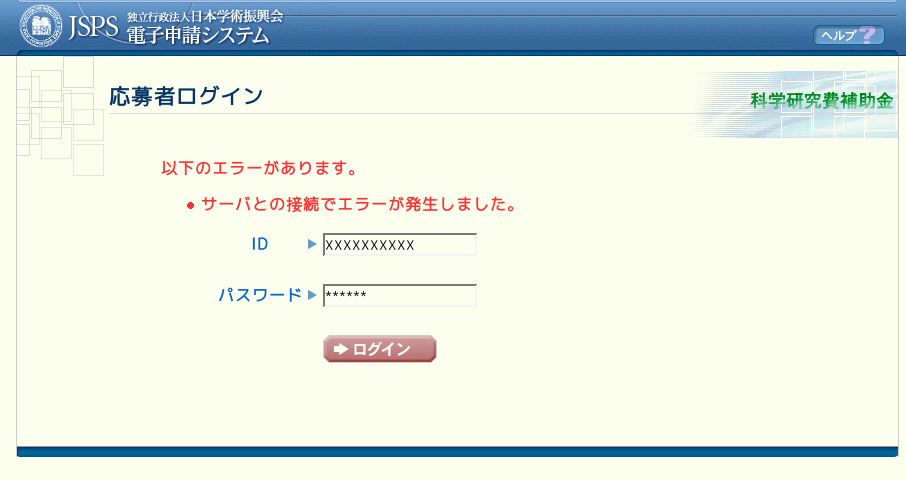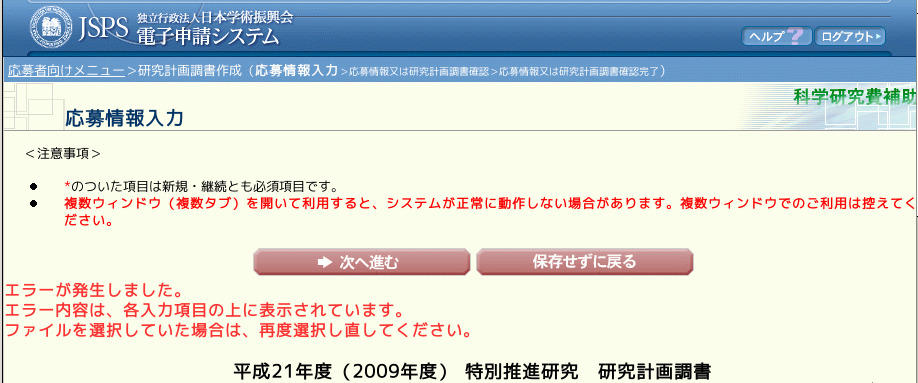
まあ、こういうものだよね。


えーーーーーー、、、、基盤は大丈夫なのに特別推進はなんか違うことをして いるのか?一体どうしろと、、、Word の書式ファイルをいれるとちゃんと 受けつけるし。科研費Latex で作ったのをイメージにして word ファイルに かぶせるとかすればいいのかしら?
つっても、非公開のを別につけているわけではない。
Copyright 1999- Jun Makino
2008/09 2008/08 2008/07 2008/06 2008/05 2008/04 2008/03 2008/02 2008/01当面の予定
Function Rate (MB/s) RMS time Min time Max time Copy: 5259.8760 0.1522 0.1521 0.1533 Scale: 5193.1555 0.1541 0.1540 0.1542 Add: 5605.1477 0.2142 0.2141 0.2143 Triad: 5582.9268 0.2150 0.2149 0.2151某 790FX マザー、Phenom 9600
Function Rate (MB/s) RMS time Min time Max time Copy: 9182.5295 0.0875 0.0871 0.0882 Scale: 9178.7115 0.0874 0.0872 0.0876 Add: 9112.7199 0.1320 0.1317 0.1327 Triad: 9093.0463 0.1327 0.1320 0.1341但し、
#pragma omp parallel for for (j=0; j<N/2; j++) __builtin_ia32_movntpd((double*)&cv[j], av[j]); // cv[j]=av[j];みたいな感じの、N君風チューニング版の話。普通の for loop だと
Function Rate (MB/s) RMS time Min time Max time Copy: 4547.2872 0.1763 0.1759 0.1774 Scale: 4372.7562 0.1834 0.1830 0.1840 Add: 4782.2452 0.2510 0.2509 0.2513 Triad: 4693.8422 0.2559 0.2557 0.2566まあ、 nF780i は出すのをはばかられるような数字がでるわけですが。
10月20日(月)以降、各研究機関内締切等の影響によりアクセス集中が頻発しており、システムへの通信が不安定になることがあります。システム操作時に通信切断が頻発する場合、しばらく時間をおいてから再度ログインしていただくなど皆様のご理解・ご協力を賜りますようよろしくお願い申し上げます。なお、9時以前もしくは19時以降は比較的つながりやすい時間帯となっております。先週の木曜から不安定だったってばさ。まあ、一層悪くなったんだろうけど。
*** Call for applications - please forward to potential PhD students ***
Important: Deadline 1st of December 2008 - (may be extended upon request)
Dear Colleagues,
The International Max-Planck Research School on Astrophysics
(IMPRS) is soliciting applications for its PhD program. Located in
the beautiful Munich-Garching area in southern Bavaria (Germany),
the school offers a unique environment for graduate students due to
the presence of four internationally renowned institutes which form
the school:
* The Max-Planck Institute for extraterrestrial Physics (MPE)
* The Observatory of the University of Munich (LMU/USM)
* The Max-Planck Institute for Astrophysics (MPA)
* The European Southern Observatory (ESO)
IMPRS offers a highly competitive PhD program, including lectures,
seminars and a research project supervised by scientists at one of
the participating institutions. Course language is English.
Students have access to ground and spaced based observatories and
instrumentation operated by the participating institutes as well as
supercomputers for advanced numerical simulations and theoretical
studies.
Successful completion of the IMPRS program will be honored with an
IMPRS certificate which supplements the doctoral degree (PhD)
document awarded by the Ludwig-Maximilians University (or another
university to be agreed upon before enrollment).
Applications for the program are open to students from all countries.
More details on the IMPRS program and the admission requirements
can be found on the IMPRS website http://www.imprs-astro.mpg.de/
The closing date for applications for the program starting in
September 2009 is December 1, 2008. If for any reason you have
problems keeping the deadline, please inform us ahead and we will
extend it upon request.
If you have any questions, do not hesitate to contact Ms Ingram at
the IMPRS office under: office @ imprs-astro.mpg.de
Please apply by using the IMPRS application form available online
at http://www.imprs-astro.mpg.de/admission.html
In addition to this announcement we have an IMPRS-poster available
which we would ask you to print and to display for your students.
The poster is available at:
http://www.imprs-astro.mpg.de/IMPRS-Poster/IMPRS_poster_2008.jpg
Thank you for your support.
Dr. Werner Becker



えーーーーーー、、、、基盤は大丈夫なのに特別推進はなんか違うことをして いるのか?一体どうしろと、、、Word の書式ファイルをいれるとちゃんと 受けつけるし。科研費Latex で作ったのをイメージにして word ファイルに かぶせるとかすればいいのかしら?
*Vacancy *for a Research and development team -- PostDoc, Programmer and Software Engineer -- *Astronomical Multipurpose Software Environment* Institution: Astronomical Institute 'Anton Pannekoek' and Section Computational Science, University of Amsterdam Description: ----------- Join our research team and help us shape the future of the Astronomical Multipurpose Software Environment (AMUSE). Our work deals with simulating dense stellar systems using AMUSE; a component library in which a wide variety of existing numerical codes that will be incorporated into a single framework. We develop a research software framework for large scale simulations in which at least two of the application domains are incorporated (stellar dynamics, stellar evolution, hydrodynamics and radiative processes). The successful candidate will participate in the design, implementation and testing of the AMUSE framework. This position requires frequent interaction with the research and development teams. Position requirements: --------------------- We are looking for: 1 software engineer, 2 programmers, 1 Postdoctoral researcher. Each candidate should have an advanced degree in computational science, astrophysics or a related field. Experience in software development and programming in Python or C/C++ are an advantage. You will be working as a problem solver in an international research team. The candidate need to perform on a scientific level. An interest in astrophysics and numerical applications is an advantage, as is experience in any of the astronomical applications (stellar dynamics, stellar evolution, hydrodynamics or radiative transfer). Are you interest in research and would like to use your unique skills to support the development of our problem solving environments this may be the job for you. Organization: ------------ The University of Amsterdam (UvA) is a university with an internationally acclaimed profile, located at the heart of the Dutch capital. As well as a world center for business and research, Amsterdam is a hub of cultural and media activities. The University of Amsterdam is a member of the League of European Research Universities. The Faculty of Science at the Universiteit van Amsterdam is one of Europe's foremost institutions of higher education and research in its chosen fields of specialization. It plays an active role in international science networks and collaborates with universities and industry. The Faculty has approximately 2,000 students and 1,500 staff members spread over four departments and ten research institutes. Each institute has its own research program, a substantial part of which is externally funded by the Netherlands Organization for Scientific Research (NWO), the Dutch government, the EU and various private enterprises. Details of appointment: ---------------------- The appointment will be on a temporary basis for a period of two years. The salary will be in accordance with the University regulations for academic personnel (Collective Labor Agreement) and will range from 2.379 EURO,- to a maximum of 4.374,- gross per month based on a full-time appointment and depending on qualifications and previous experience. The salary will be increased with 8 % holiday allowance and 8,3 % end-of-year bonus. Interested candidates should send their resume, cover letter and three letters of recommendation (Postdoc and Software engineer only) to the above address or email to application-science@uva.nl (write AMUSE in the subject heading). Submit resumes to: drs. S.H.M. Jongerius Universiteit van Amsterdam, Faculty of Science (Office of Personnel) Kruislaan 403 1098 SM Amsterdam the Netherlands email: application-science-at-uva.nl (mention AMUSE in Subject) For more information: --------------------- Dr. S. Porteiges Zwart email S.PortegiesZwart-at-uva.nl URL1: http://muse.li (AMUSE predecessor project page) URL3: http://modesta.science.uva.nl/ (Modeling Dense Stellar Systems project page) URL2: http://staff.science.uva.nl/~spz/ (P.I. Homepage) The closing date for receipt of applications: 1 December 2009
Carl Sagan Postdoctoral Fellowships in Exoplanet Exploration (Applications Due: Nov. 6, 2008)The new Carl Sagan Postdoctoral Fellowships in Exoplanet Exploration were created to inspire the next generation of explorers seeking to learn more about planets, and possibly life, around other stars. The program will award stipends of approximately $60,000 per year, for a period of up to three years, to selected postdoctoral scientists. Topics can range from techniques for detecting the glow of a dim planet in the blinding glare of its host star, to searching for the crucial ingredients of life in other planetary systems.
The Sagan Fellowship will join NASA's new Einstein Postdoctoral Fellowship in Physics of the Cosmos and the Hubble Postdoctoral Fellowship in Cosmic Origins. All three fellowships represent a new theme-based approach, in which fellows will focus on compelling scientific questions, such as "are there Earth-like planets orbiting other stars?"
The application deadline is Nov. 6, 2008. For specific fellowship guidelines and application information, visit http://nexsci.caltech.edu/sagan/fellowship.shtml